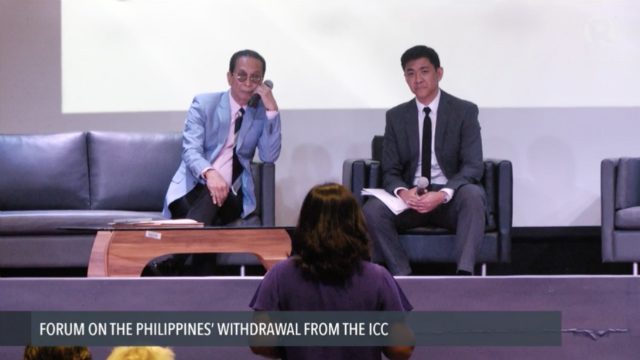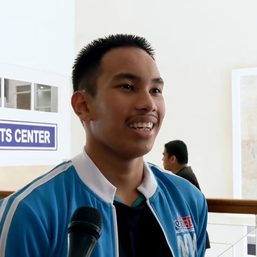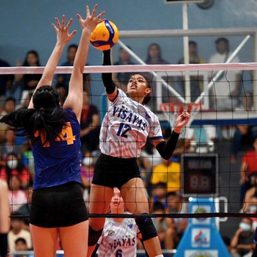SUMMARY
This is AI generated summarization, which may have errors. For context, always refer to the full article.

MANILA, Philippines – A lawyer grilled Chief Presidential Legal Counsel Salvador Panelo on Tuesday, March 20, on why President Rodrigo Duterte withdrew the Philippines from the International Criminal Court (ICC) in a decision “very personal” to him.
Lawyer Emerlynne Gil, senior international legal adviser for the International Commission of Jurists (ICJ), asked Panelo a series of questions during a forum on the Philippines’ withdrawal from the ICC.
The forum was organized by the University of the Philippines (UP) College of Law and the Integrated Bar of the Philippines, and was held at UP Bonifacio Global City in Taguig City.
In a 12-minute exchange with Panelo, Gil asked: Was there “extensive consultation” before Duterte decided to withdraw the Philippines from the ICC?
Panelo answered, “One, the President is the chief architect of foreign policy. He doesn’t have to consult.”
Gil later remarked that the decision to withdraw from the ICC seems “very personal to the President,” which makes it an “area of concern.” She said that this “cannot be a decision of an individual that has an impact on all.”
Panelo responded by challenging Gil to cite a “bad effect” of withdrawing from the ICC.
Gil replied, “It actually shows that the Philippines is turning its back on international rule of law.” (READ: FULL TEXT: Duterte’s statement on Int’l Criminal Court withdrawal)
Gil also questioned why the Philippines justifies its withdrawal from the ICC by saying the United States was never its member in the first place.
Read part of the exchange between Gil and Panelo below:
GIL: Since this is a decision that affects all of us Filipinos, has there been an extensive consultation among government agencies and even the public on this decision? That’s my first question. Second…
PANELO: Maybe we should respond immediately to that so that we’ll not be lost. One, the President is the chief architect of foreign policy. He doesn’t have to consult. He precisely was elected to be the leader of this country, and everything that he does will be a reflection of the sentiments of the Filipino people, and, to my mind, there is no need for an extensive discussion on that with respect to the other sectors of society. He has studied that, he’s been there, he has been in fact threatening to do that. He has finally done it.
GIL: Thank you for responding to that question, Attorney Panelo. Because the way the statement was issued, and even the notice, and how you spoke right now, it actually seems that this is a decision that is very personal to the President, and actually has an impact on the entire country, and that is really an area of concern for us because, to us, it cannot be the decision of a personal—, it cannot be a decision of an individual that has an impact on all.
PANELO: Let me ask you: what is the effect of the withdrawal of this country from the ICC? Give me a bad effect.
GIL: It actually shows that the Philippines is turning its back on international rule of law. So it means that we refuse to be part of the international community. We have actually—, you said that the Philippines is one of the very few countries in Asia that is state party to the ICC. That is true, and that is actually something that we should be proud of, because we have joined this community, and we are ready to combat impunity through these type of proceedings, through this court.
PANELO: Are you saying now that the United States and other major countries who have withdrawn, and do not want to be members, are not respecting the rule of law? Precisely it’s the rule of law that the President is invoking in removing itself from the jurisdiction of the ICC.
GIL: Attorney Panelo, one thing I noticed is that we always compare ourselves to the United States. One of the things that I can say, I studied in the United States, I went to law school also in the United States. One of the things that we can say is that, the United States is not the best example when it comes to international human rights law or even international law. So as a country that aims to be a responsible citizen or a responsible member of the international community, I am not sure if we should be comparing ourselves to the United States.
PANELO: But even without the comparison, as i said, what effect? You said that we will come out as a violator of the rule of law, but precisely it’s the President invoking the rule of law. You’re violating the rule of law in this country, and our country should reign supreme over that Rome Statute, which is not enforceable in the first place. You’re putting me in your jurisdiction when you cannot do that.
GIL: I think you will find in our letter – number one, let me just point out that it doesn’t really adequately explain the statement of the President, how the preliminary examination violates the rule of law. Number two, the preliminary examination, as you clearly stated, is not an investigation, and it doesn’t put the President or any other person under its jurisdiction. It’s actually really the very first phase, very first phase, of ascertaining whether it has jurisdiction. That’s why we indicated in our letter, the ICJ actually indicated in its letter, that one of the best steps that the Philippines could have taken to thwart ICC jurisdiction is to respond to the prosecutor that it is investigating all these allegations of extrajudicial killings. So instead of running away from the ICC, it should have faced it. That would have thwarted the ICC from acquiring jurisdiction.
– Rappler.com
Add a comment
How does this make you feel?





There are no comments yet. Add your comment to start the conversation.